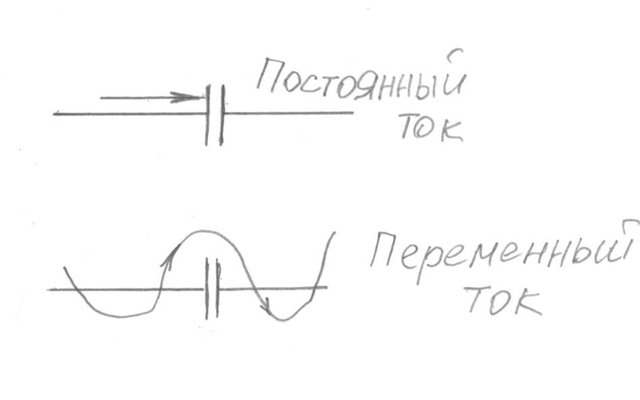Answer the question
In order to leave comments, you need to log in
Why does a capacitor pass current when charging/discharging?
When charging, the current passes through the dielectric? How?
Answer the question
In order to leave comments, you need to log in
First, a picture from the series "physicists are joking":

With its help, you can remember what the capacitor lets through and what does not.
You can roughly imagine it this way - in the process of charging, the molecules of the dielectric turn around and move in a certain way in order to orient themselves along the field lines. This process stops when the strength of chemical bonds between molecules becomes equal to the force with which the electric field seeks to move them.
As long as this force is smaller, the charges can move, which by definition is the "flow of electric current."
Takeaway from comments:
How is a dielectric different from a conductor? There are free charge carriers in the conductor - that is, gizmos (electrons (in metal), ions (in liquid)), which can move freely in matter.
In the dielectric, these citizens are tied, roughly speaking, to their place with an elastic band - it does not allow them to fall into free swimming, but allows them to move in a limited way. So, as long as the electric field is strong enough to move these charge carriers, the current flows quite well.
This cannot continue indefinitely, because at some point all the "elastic bands" will stretch (the capacity is charged) and the current will stop flowing. But if you apply too large a field, the "gum" will break, the charges will fall out of their places - a breakdown of the dielectric will occur.
no, current does not pass through the dielectric (until electrical breakdown).
current goes to the accumulation of electric charge on the capacitor plates.
when the capacitor is discharged, the current is caused by the outflow of the charge accumulated on the plates.
analogy: pumping gas into a closed balloon.
the air flow through the hole (current through the terminals) goes to increase the pressure in the balloon (voltage between the plates).
there is no air flow through the walls (there is no current through the dielectric).
No current passes through the capacitor. There is current in the circuit until the capacitor is charged or discharged.
When a capacitor is charged under the action of an external EMF greater than the EMF of the capacitor, the charges move along the conductors and accumulate on the plates. When the EMF of the capacitor is discharged, it is greater than the external one and the accumulated charges move along the circuit in the opposite direction.
Depending on what you mean.
If we consider Maxwell's equations, then in the equation for the rotor of the magnetic field there is a so-called "bias current" - just such a "current" flows in the capacitor during charging / discharging. But, of course, there is no movement of charges as such, if the dielectric is "real".
But many dielectrics also have non-zero conductivity, so the capacitor can "leak".
No current passes through the capacitor at all, it does not pass current. But it can work with alternating current. When the poles of the current source change, the charge on the capacitor plates also changes, therefore, current also CONDITIONALLY passes through it.
A capacitor is connected to a DC circuit in parallel, if connected in series, then the capacitor will serve as a resistor with a huge resistance
Initially, the question was asked incorrectly. And all the experts are already alarmed. Definitely, if the conder misses, then it is under replacement.
Didn't find what you were looking for?
Ask your questionAsk a Question
731 491 924 answers to any question